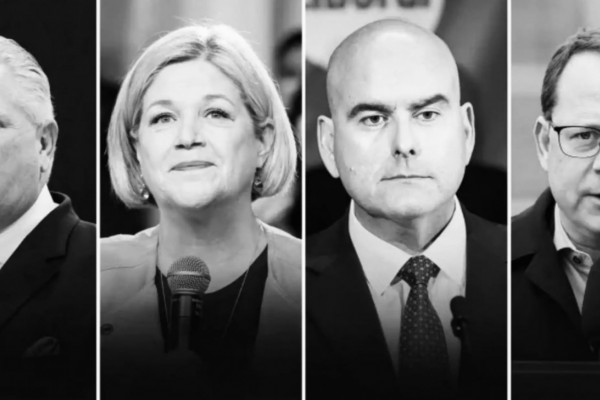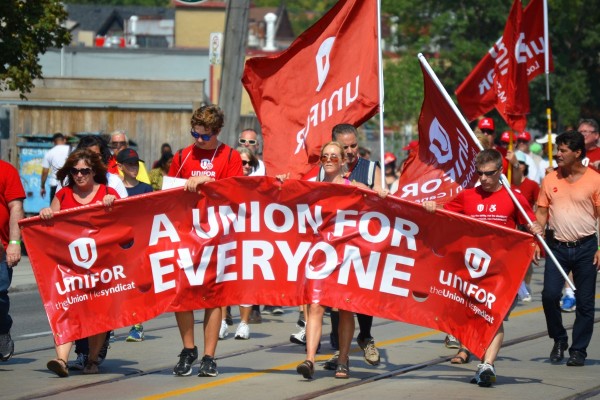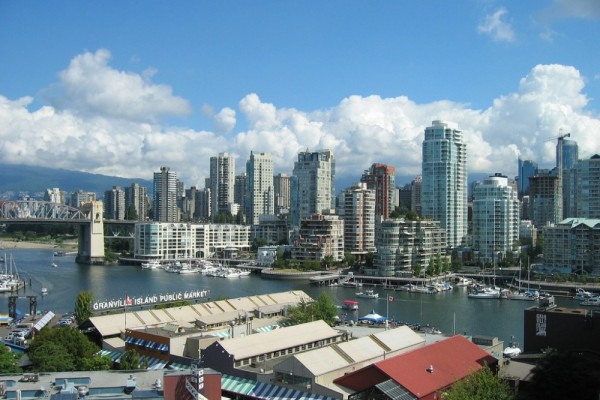Canada’s in a housing crisis. It’s time for radical solutions
We need to change course and start thinking of housing as a human right—not a financial asset

If we’re serious about tackling the housing crisis, we need to have the honesty to point out the root of the problem: that we view housing as an investment and commodity, rather than a universal human right. Photo from Shutterstock.
Recent polling shows that more than ever, Canadians cite housing affordability as one of their top election issues—especially young Canadians. This should come as no surprise: years of political inaction has led us to a desperate housing emergency in which speculators and developers reap massive profits, while working class Canadians pay record amounts of their income just to have a roof over their heads.
Housing costs in Canadian cities have become some of the most expensive anywhere in the world, increasing at a rate completely out of step with our stagnant wage growth. Our housing market no longer reflects the needs and demands of regular Canadians. Instead, it reflects the interests of a small and wealthy investor class, concerned only with cashing in as much as possible at everyone else’s expense—and who can blame them, when the government itself admits it has their back?
Enough is enough.
If we’re serious about tackling the housing crisis in this country, we need to have the guts and the honesty to point out the root of the problem in the first place: that we view housing as an investment and commodity, rather than a universal human right.
When we approach housing as a lucrative portfolio opportunity, rather than a human necessity like healthcare and education, it’s only inevitable that we end up with an absurd situation where we have more empty houses than there are homeless people. It’s at the point where even politicians are now openly flipping houses for profits. The good news, however, is that fixing our approach to housing isn’t rocket science: we just need to follow proven examples that we’re seeing implemented across the world.
Take Finland for example. The country recently announced that by 2027, they expect to have completely eliminated homelessness nationwide. This isn’t due to band-aid style fixes like a tiny foreign buyers’ tax or more handouts for big property developers—it’s because they have adopted a policy based on the “Housing First” model, in which all citizens are guaranteed a safe home without preconditions.
The philosophy is both compassionate and reasonable. In one of the richest societies in the history of the world, there is truly no reason that we can’t guarantee housing like we do healthcare—especially when Finland’s Housing First program saves at least CAD$22,000 in taxes per person housed. With results like that, even fiscal conservatives have a reason to jump on board. In our view, there is no reason Canada should not follow Finland’s example and enshrine housing as a human right in the Charter of Rights and Freedoms, guaranteeing all Canadians the right to a secure roof over their head.
Expanding public housing has also been an historically proven way of providing accessible, affordable housing to all people. The city of Vienna, Austria, for example, tops worldwide quality of life surveys year after year. Yet unlike Canadian cities, it’s typical for an apartment to cost as little as 10 percent of a person’s income. The big difference in Vienna is that two-thirds of residents live in public housing units—and while in North America we often picture public housing as shabby or undesirable, Viennan public housing is beautiful and widely sought after by local residents.
Because the majority of housing is public, housing costs are kept safe from the wild fluctuations of the private market, meaning that housing costs reflect the working class citizens who need it rather than powerful wealthy investors. Likewise, Finland keeps rent affordable by mandating that 25 percent of all housing in major cities be affordable social housing.
It’s time we change course, stop thinking of housing as a
financial asset, and start treating it like what it really is: a necessity and human right. Photo courtesy Citizens for Public Justice.
In the Montréal riding of Longueuil—Charles-LeMoyne, residents were just hit with the biggest rent increase in 18 years, including a 30 percent cost increase for unoccupied units. As one of Canada’s lowest income ridings, unexpected increases like this just aren’t sustainable—especially when over one-third of tenants spend at least 30 percent on rent each month. If we want to help shield Canadians from an unaffordable market, a major solution would be to build more public, non-market housing supply, just as we already did until 1993, when the Conservative Party scrapped a federal program that built at least 20,000 units of social housing a year. If that program were still in place, we’d have had over half a million extra public housing units by 2021. For its part, the NDP has a strong plan to build over 500,000 new affordable units in ten years.
Hopefully we can make up for lost time, and eventually aim even higher.
One thing that Canada is doing right, however, is community land trusts: non-profit corporations that hold land on behalf of a local community, rather than the government doing so directly. Here in Québec, you’ll find one of North America’s largest: the Milton Park Community Land Trust, which has been successfully providing affordable housing to residents for over four decades, especially low-income people of colour and LGBTQ+ people. Similarly to public housing projects, the federal government should absolutely provide funding to help kickstart more community land trusts, ensuring working class Canadians can have more say in their communities and be free from the predatory behaviour of property speculators.
In addition to NDP plans for helping first-time home owners, this would also provide would-be buyers with more affordable alternatives over the private market through lease-to-own agreements. We should also create a nationwide Canadian Sovereign Land Trust, with powers to purchase land more cheaply and help promote the transfer of land out of the private market and into the secure non-profit sphere. The trust could also cover developers’ land costs, ensuring that they’re actually increasing our housing supply with perpetually affordable, non-luxury units.
Besides these major solutions, we would like to see more politicians consider a number of other policies:
- A national landlord and rent registry would help keep landlords accountable to renters, who want more transparency.
- Expropriation of any corporation with more than 1,000 rental units, as seen recently in Berlin, as well as major tax hikes on people with many properties, would help to free up the housing supply from profiteering interests.
- Ensuring that we move away from the widely criticized and financially wasteful practice of public-private partnerships, such as seen under the Liberal’s Canada Infrastructure Bank, which effectively operates as a tax dollar giveaway for ultra-wealthy developers.
- Nationwide green retrofitting programs, as well as heavy investment into the disgracefully poor housing conditions of Canada’s Indigenous communities.
- At the provincial level, enacting rent controls, as well as a right of first refusal policy on the selling of any rented property, would help to guarantee affordability for Canadian renters.
After decades of the exact same policies, we’ve seen little to no real fix to the problem. Still, politicians continue to prescribe the same do-nothing solutions, insisting that our housing market will simply correct itself—meanwhile housing prices have now officially increased for 24 straight years uninterrupted. Any day now, right?
It’s clear what needs to be done: countries all over the world have enacted successful, compassionate, and smart solutions to the issue of housing, and our government ignores it. It’s time we change course, stop thinking of housing as a financial asset, and start treating it like what it really is: a necessity and human right, that the government both can and should guarantee.
As the late David Graeber once wrote: “The ultimate, hidden truth of the world is that it is something that we make, and could just as easily make differently.” When things are going this bad, the last thing we need is even more of the same. Radical problems always require proven, radical solutions.
Correction: A previous version of this article incorrectly stated the timeframe for the NDP’s proposed completion of 500,000 affordable homes. The party has in fact committed to building half-a-million new affordable homes in ten, not five, years. Canadian Dimension regrets the error.
Kalden Dhatsenpa is a Tibetan writer and artist based in Tio‘tià:ke, or Mooniyang, or Montréal. He is the national anti-oppression coordinator for Courage, host of the film podcast Cheapy Tuesdays, and a federal candidate for the NDP in Longueuil—Charles-Lemoyne.
Gavin Armitage-Ackerman is a writer, critical theorist and eco-socialist. Follow him on Twitter @ouaiscestgarbo.










